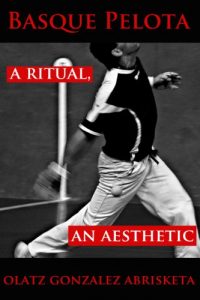"Learn, children / To Speak Basque, / Play pelota, / And dance correctly." -- Basque popular song
"This vibrant and communitarian game had to wait for Olatz González Abrisketa for a much needed ethnography that would reveal its social and symbolic dimensions." -- Joseba Zulaika
The game of pelota is, as Wilhelm von Humboldt described it, "the principal festival of the Basuqes," and is, for Pío Baroja, "the Basque game per excellence." Indeed, as Olatz González Abrisketa aptly demonstrates in "Basque Pelota: A Ritual, An Aesthetic," pelota is one of the most revealing frameworks of meaning and understanding of the Basque imaginary. By digging into the historic, symbolic, and even mythological roots of the sport, and by describing interconnected webs of meaning in the various domains of social, juridical, bodily, and imaginative experience, she shows how pelota constitutes a ritualized action that both stages and repairs social antagonisms by offering a "deep play" that prevents violent conflict and implies a paramount cultural transformation for the Basuqes. Furthermore, she shows that the "joko" or "agon" of pelota has a foundational role in culture; the metaphoric extensions of "hand," "pelota," and "body"; and how the fronton or plaza is the Basque public space par excellence and a monument to the community's memory.
Olatz González Abrisketa is a professor of social anthropology at the University of the Basque Country. Among her many recent publications and presentations, "Being Public" and "Bodies out of Place: Gender, Space and Community in the Basque Sport of Pelota" are of particular note. In addition, she has directed several documentaries, the most recent of which, "Carmen," won an award from the Society for Visual Anthropology.
"This vibrant and communitarian game had to wait for Olatz González Abrisketa for a much needed ethnography that would reveal its social and symbolic dimensions." -- Joseba Zulaika
The game of pelota is, as Wilhelm von Humboldt described it, "the principal festival of the Basuqes," and is, for Pío Baroja, "the Basque game per excellence." Indeed, as Olatz González Abrisketa aptly demonstrates in "Basque Pelota: A Ritual, An Aesthetic," pelota is one of the most revealing frameworks of meaning and understanding of the Basque imaginary. By digging into the historic, symbolic, and even mythological roots of the sport, and by describing interconnected webs of meaning in the various domains of social, juridical, bodily, and imaginative experience, she shows how pelota constitutes a ritualized action that both stages and repairs social antagonisms by offering a "deep play" that prevents violent conflict and implies a paramount cultural transformation for the Basuqes. Furthermore, she shows that the "joko" or "agon" of pelota has a foundational role in culture; the metaphoric extensions of "hand," "pelota," and "body"; and how the fronton or plaza is the Basque public space par excellence and a monument to the community's memory.
Olatz González Abrisketa is a professor of social anthropology at the University of the Basque Country. Among her many recent publications and presentations, "Being Public" and "Bodies out of Place: Gender, Space and Community in the Basque Sport of Pelota" are of particular note. In addition, she has directed several documentaries, the most recent of which, "Carmen," won an award from the Society for Visual Anthropology.






